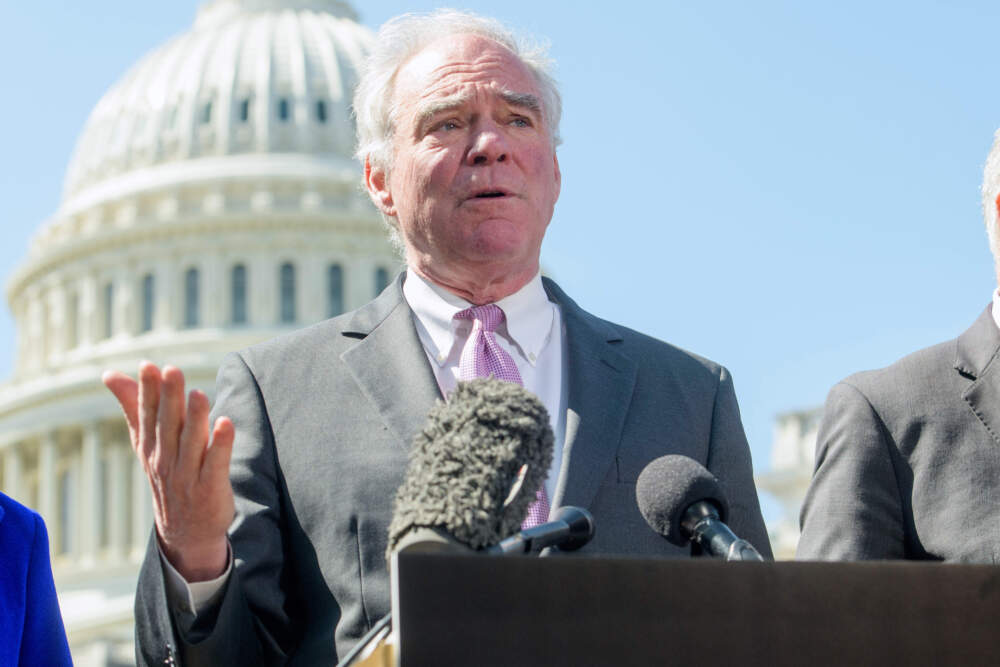As tensions simmer between Iran and Israel, Senator Tim Kaine (D-VA) has issued a stark warning against potential U.S. military involvement. In a recent interview, Kaine described such intervention as a ‘horrible, horrible mistake,’ emphasizing the catastrophic consequences of engaging in another Middle Eastern conflict. With the Trump administration seemingly divided on the issue, Kaine is pushing for a congressional resolution to ensure that any military action receives proper debate and approval. This article delves into Kaine’s concerns, the potential ramifications of U.S. involvement, and the senator’s efforts to ensure congressional oversight.
Kaine’s Warning: A Third Middle East War
Senator Kaine’s primary concern centers on the potential for a full-scale war in the Middle East, which he believes would be a ‘horrible, horrible mistake.’ He stresses the risks to U.S. service members and the destabilizing effect it would have on the region. According to Kaine:
‘A third war in the Middle East in this century would be a horrible, horrible mistake, and it’s going to put U.S. service members at risk and also risk destabilizing the region.’
Kaine’s apprehension stems from the complex and volatile nature of the region, where further U.S. involvement could exacerbate existing tensions and lead to unforeseen consequences.
Seeking Congressional Approval
To prevent unilateral action by the executive branch, Kaine has introduced a resolution that would require congressional approval before U.S. troops can engage in military conflict with Iran. He emphasizes the constitutional requirement for Congress to debate and authorize military action, stating:
‘So that’s why I introduced the resolution to force Congress to do what the Constitution requires, which is debate whether the U.S. being in war against Iran is a good idea or not.’
The resolution aims to ensure that the decision to engage in military conflict is not made lightly and has the backing of the legislative branch.
Can the Resolution Pass a Republican-Controlled Senate?
Kaine acknowledges the challenge of passing the resolution in a Republican-controlled Senate, where loyalty to President Trump is often strong. However, he reminds his colleagues of Trump’s previous statements against prolonged military engagements in the Middle East:
‘We shouldn’t be in another war in the Middle East. The forever wars are over.’
Kaine hopes to appeal to Republicans who share Trump’s skepticism about foreign military interventions, arguing that the resolution aligns with the president’s stated policy goals.
Trump’s Decision-Making Process
While acknowledging that Congress may not always sway Trump’s decisions, Kaine points to a previous instance where congressional action influenced the president’s behavior. Following a U.S. strike that killed Iranian guard leader Qasem Soleimani, Kaine filed a motion requiring congressional approval for war with Iran. Although Trump vetoed the bill, Kaine believes it had an impact:
‘President Trump vetoed the bill, and we couldn’t override the veto, but guess what? He saw what the bill meant, and he backed off.’
Kaine suggests that even if the resolution fails to pass or is vetoed, it can still send a powerful message to the president, influencing his decision-making process.
Iran’s Nuclear Capabilities
When asked about Iran’s nuclear capabilities, Kaine stated that while Iran has increased its uranium enrichment and centrifuges since the U.S. withdrew from the nuclear deal, there is no indication that it has decided to develop a nuclear weapon:
‘Yes, and once the U.S. blew up the nuclear deal, Iran has continued to enrich uranium and increase centrifuges, but there is no indication that Iran has made a decision to turn that into a nuclear weapon.’
This assessment suggests that while Iran’s nuclear program is a concern, it does not necessarily warrant immediate military intervention.
Threats to American Forces in the Region
Kaine also addressed the potential dangers faced by American forces already stationed in the region. He noted that U.S. military positions are well-known and vulnerable to attacks from militias:
‘All I can say is based upon what’s happened already, the militias, for example, have been firing drones into U.S. military positions often over the course of the last 5 or 6 years. U.S. positions are pretty well known in the region. And they end up facing a lot of potential threats.’
Kaine emphasized that Iran has warned of increased attacks against U.S. positions if the U.S. enters the war on behalf of Israel, a threat that he believes should be taken seriously.
Conclusion: A Call for Caution and Congressional Oversight
Senator Tim Kaine’s warning against U.S. involvement in the Iran-Israel conflict highlights the significant risks and potential consequences of further military engagement in the Middle East. His push for congressional approval underscores the importance of legislative oversight in matters of war and peace. As the Trump administration weighs its options, Kaine’s voice serves as a reminder of the need for caution, deliberation, and adherence to constitutional principles. The senator’s efforts to foster debate and ensure congressional involvement could prove critical in preventing a ‘horrible, horrible mistake’ that could have far-reaching implications for the United States and the world.

Leave a Reply